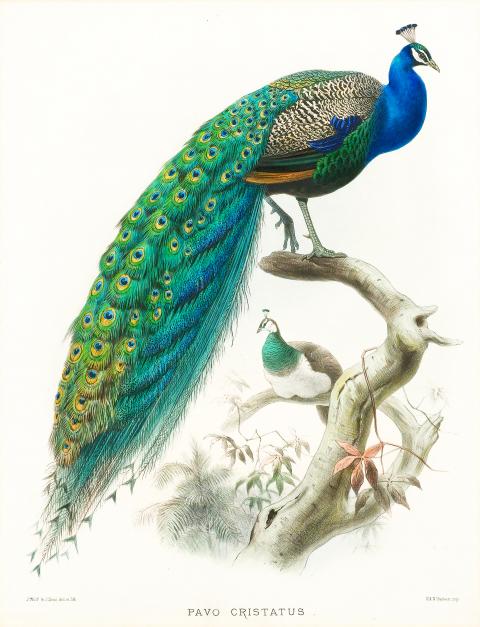Chinese Practice
目中無人
(mu4 zhong1 wu2 ren2)

Photo: Wikimedia Commons
照片:維基共享資源
to consider everyone else beneath you
英文中有個習語「have one’s nose in the air」,字面意義為某人把鼻子挺得高高的。若有人把頭抬高、仰起下巴、鼻尖凸出、用鼻孔對著人,就會給人一種自視甚高、目中無人的高傲的感覺。
成語「目中無人」——眼中沒有他人,只有自己——即是用來形容人高傲自大、瞧不起別人。此語出自明末小說家凌濛初〈西元一五八○~一六四四年〉的《初刻拍案驚奇》卷一三的一個故事:有一對夫婦老來得子,因此對這寶貝兒子非常溺愛,兒子想要什麼,老夫婦一定會千方百計想辦法弄來。結果,兒子反而給慣壞了,長大後只會結交狐群狗黨、胡作非為,而且他目中無人,竟還對父親動粗,讓兩老傷心不已。
另外一個類似意義的成語為「目空一切」——什麼都不放在眼裡,也是形容人高傲自大。此語一般認為出自南宋政論家陳亮〈西元一一四三~一一九四年〉的〈題喻季直文編〉。文中陳亮論及他的四位朋友,其中一位朋友「目空四海,獨能降意於一世豪傑,而士亦樂親之。」(他自視甚高,什麼都不放在眼裡,但是對豪傑之士還是能壓低姿態、以禮相待,所以讀書人也很樂意跟他來往。)成語「目空一切」即是由「目空四海」所演變出來的。
我們現今口語所說的「眼睛長在頭頂上」,也大約是這個意思。另外還有一種說法「鼻孔撩天」(或作「鼻孔朝天」),也是充滿視覺形象的形容。「目中無人」、「目空一切」、「眼睛長在頭頂上」、「鼻孔撩天」等這些成語,以及英文的「have one’s nose in the air」,一個比一個生動,就像是諷刺畫般活靈活現地幾筆勾勒出這驕傲的神態。
(台北時報林俐凱)
這位影星嚐到了走紅的滋味,就開始耍大牌、目中無人,結果得罪了全劇組。
(This movie star has had a taste of success, and is now putting on airs and walking around with his nose in the air. He’s got the backs up of the whole film crew.)
有人認為,年少得志容易目空一切、恃才傲物,反而失去了許多寶貴的學習機會。
(Some say it’s easy to become full of yourself and conceited if you succeed early on, but you risk losing the opportunity to continue learning.)
英文練習
have one’s nose in the air
In English, there is a common saying that goes “to have one’s nose in the air,” which literally means to walk around with your nose held high. If somebody has their nose elevated in this manner, with their jaw lifted and the tip of their nose turned up, showing people the inside of their nostrils, it imparts an impression not only of excessive self-regard but also of an arrogance betraying a distinct disregard of others.
In Chinese, this idea — of being so arrogant you only think of yourself — is encapsulated in the idiom 目中無人. The phrase derives from a story in chapter 13 of the late Ming Dynasty collection of short stories Slapping the Table in Amazement I by Ling Mengchu (1580–1644). In the story, a couple are blessed with a child late on in life, and spoil it: Whatever the child wanted, the couple would do everything within their power to make sure that he got it. Over time, the child became accustomed to this, and when he grew up he ran with gangs and got himself into trouble. The son had complete disregard for others, and even hit his own father, to his parents great sadness.
There is another idiom, too, with a similar meaning: 目空一切, literally the inability to see anything, indicating arrogance in a person. It is generally believed that this phrase comes from the Preface to the Works of Yu Jizhi by the Southern Song Dynasty political writer Chen Liang (1143-1194). In the text, Chen discusses four friends, one of whom he describes as “being oblivious to the four seas” — 目空四海 — and of viewing himself very favorably, on a par with very capable peers, such that he could mix in the same circles as the educated elite. Over time, 目空四海 evolved into the idiom 目空一切.
A modern colloquial term with a meaning essentially the same as this is 眼睛長在頭頂上, literally “eyes growing on the top of one’s head.” Another phrase is 鼻孔撩天, sometimes written 鼻孔朝天, literally “nostrils turned up to face the heavens,” is another very visual description. These are very similar to the English phrase “have one’s nose in the air,” wittily conjuring up the image of an arrogant posture often seen in satirical drawings.
(Translated by Paul Cooper)
Look at that guy with his nose up in the air like that. Who does he think he is?
(你看那個人目中無人的樣子,他以為自己是誰呀?)
She’s always got her nose up in the air, but I don’t think she means to be arrogant. It’s just her posture.
(她總是把下巴抬得高高的,可是我覺得她並不是傲慢,只是姿勢的關係。)

In an effort to fight phone scams, British mobile phone company O2 has introduced Daisy, an AI designed to engage phone con artists in time-wasting conversations. Daisy is portrayed as a kindly British granny, exploiting scammers’ tendency to target the elderly. Her voice, based on a real grandmother’s for authenticity, adds to her credibility in the role. “O2” has distributed several dedicated phone numbers online to direct scammers to Daisy instead of actual customers. When Daisy receives a call, she translates the scammers’ spoken words into text and then responds to them accordingly through a text-to-speech system. Remarkably, Daisy

Bilingual Story is a fictionalized account. 雙語故事部分內容純屬虛構。 Emma had reviewed 41 resumes that morning. While the ATS screened out 288 unqualified, she screened for AI slop. She could spot it a mile away. She muttered AI buzzwords like curses under her breath. “Team player.” “Results-driven.” “Stakeholder alignment.” “Leveraging core competencies.” Each resume reeked of AI modeling: a cemetery of cliches, tombstones of personality. AI wasn’t just changing hiring. It was draining the humanity from it. Then she found it: a plain PDF cover letter. No template. No design flourishes. The first line read: “I once tried to automate my

Every May 1, Hawaii comes alive with Lei Day, a festival celebrating the rich culture and spirit of the islands. Initiated in 1927 by the poet Don Blanding, Lei Day began as a tribute to the Hawaiian custom of making and wearing leis. The idea was quickly adopted and officially recognized as a holiday in 1929, and leis have since become a symbol of local pride and cultural preservation. In Hawaiian culture, leis are more than decorative garlands made from flowers, shells or feathers. For Hawaiians, giving a lei is as natural as saying “aloha.” It shows love and

1. 他走出門,左右看一下,就過了馬路。 ˇ He walked outside, looked left and right, and crossed the road. χ He walked outside and looked left and right, crossed the road. 註︰並列連接詞 and 在這句中連接三個述語。一般的結構是 x, y, and z。x and y and z 是加強語氣的結構,x and y, z 則不可以。 2. 他們知道自己的弱點以及如何趕上其他競爭者。 ˇ They saw where their weak points lay and how they could catch up with the other competitors. χ They saw where their weak points lay and how to catch up with the other competitors. 註:and 一般連接同等成分,結構相等的單詞、片語或子句。誤句中 and 的前面是子句,後面是不定詞片語,不能用 and 連接,必須把不定詞片語改為子句,and 前後的結構才相等。 3. 她坐上計程車,直接到機場。 ˇ She took a cab, which took her straight to the airport. ˇ She took a cab and it took her straight